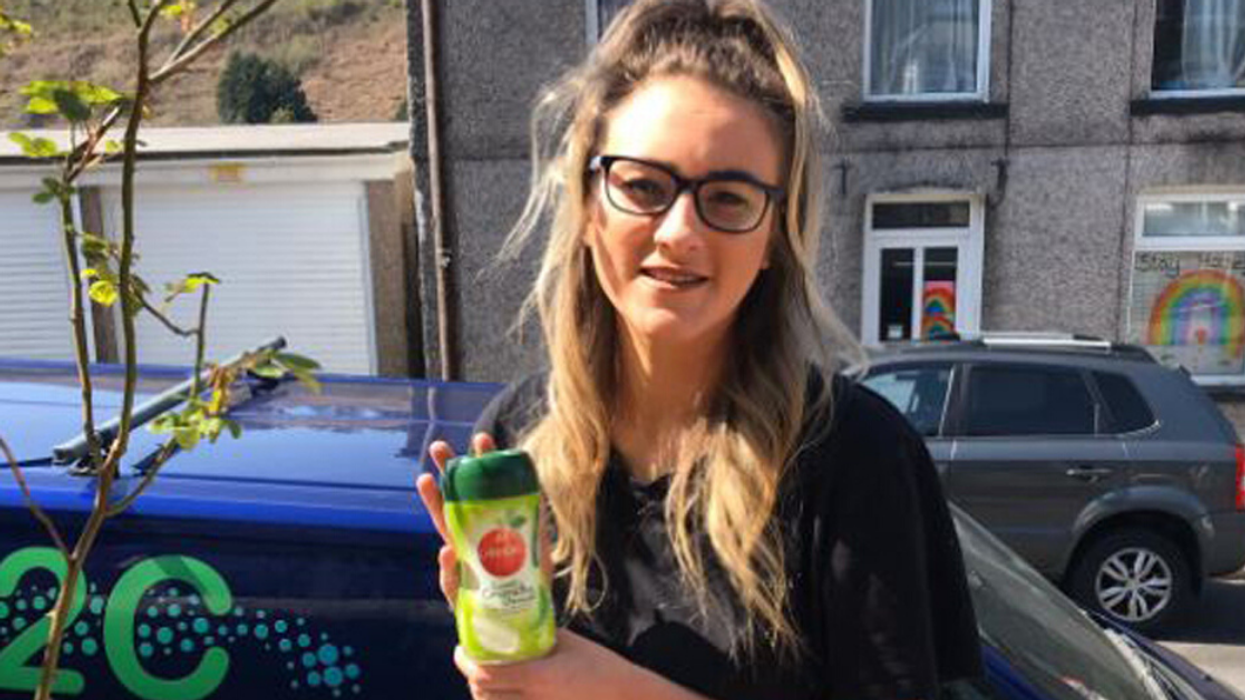This young mom swears a sweetener saved her unborn baby after coating her sandwiches in it when her water broke at 20 weeks. She was so impressed by her NHS care that she quit studying criminology to train as a neonatal nurse and aims to work at the hospital that treated her premature daughter.
When Lois Sheppard enrolled at Swansea University her ambition was to become a forensic scientist.
She found out she was pregnant in October 2016, the start of her second year, and she refused to give up on being a mother or her dreams of working in forensics.
Things got complicated when her water had “effectively broken" at 20 weeks, four weeks before the NHS considers a pregnancy viable.
Sheppard was asked to consider a termination, instead, she scoured the internet for ways to build up her amniotic fluid and found positive testimonies from women who swore by the natural sweetener, Stevia.

She ate a tub of Stevia every two weeks. Covering her breakfast cereal and sandwiches in it. And, to her doctors' amazement, she made it to 32 weeks.
Maisie was born on April 24, 2017, weighing 4lb at Swansea's Singleton Hospital.
“I did lots of research and kept coming across this sweetener, Stevia, and how it could build up the amniotic fluid," Sheppard said.
“I started putting it in every drink and on every meal. I would put three tablespoons in my squash, on my cereal and even in my sandwiches."

“It wasn't the nicest of diets, but I figured there was nothing to lose," she continued.
“I've always said that the Stevia saved my pregnancy. If I hadn't had it as often, I really don't think I would have built up as much fluid as I did."
She used two tablespoons of Stevia in anything and everything she ate, from her squash to her cheese and ham sandwiches. Sheppard got through the best part of an entire 75g tub in her first week.
And, much to her doctors' surprise her amniotic fluid had slightly increased.
At her two subsequent weekly check-ups, medics were shocked to see the amniotic fluid was either increasing or maintaining its levels.
Sheppard felt like she had passed the “finish line" when she reached 24 weeks.

“It felt absolutely amazing getting to that point of my pregnancy, even though it was so scary to be in that situation. It was just such a relief," she said.
“If anything went wrong from that point, I knew that I'd be given treatment because the baby was viable – it was such a weight off my shoulders."
But it was the exceptional care given to her premature baby during her five-week scare in the hospital after her birth that persuaded Sheppard to transfer from the criminology course to train as a neonatal nurse.

“My ultimate dream is to go back to the Singleton Hospital as a full time neonatal nurse – and one day to become a specialist there," she said.
“They saved my daughter and, therefore, gave me the most important thing I have in my life. Now I want to help them carry on that work."
“I feel a true affinity with the nurses and the wards there."
Her roommates suggested she take a pregnancy test after being sick for a week during October.
“When my housemates suggested it, I told them not to be silly," she said. She was not expecting a pregnancy.
“Later that morning we were all huddled in the toilet and the test must have turned positive in 0.01 seconds, sending my mind into complete overdrive."

“I had no idea what I was going to do," she said.
Deciding she could have her baby and complete her criminology course, she carried on as usual. Until that November when, she moved in with her grandma, Susanne, in Bridgend.
“I knew I wanted to keep my baby and carry on with my studies, but uni life wasn't working out well for me," she recalled. “I think everybody should experience it, but not when you're pregnant. The house was dirty and messy and everyone was always coming home drunk."

“That lifestyle wasn't for me anymore," she continued.
She successfully handled her studies and her pregnancy despite her doubts.
“The 20-week scan is when everything changed. We were so excited to find out the sex of the baby. Would it be team pink or team blue?" she said.
“Just a few seconds in and the sonographer was calling her colleagues into the room, so I knew something was wrong."

“They told me my water had already broken, then they took me into a side room and all I could see was a box of tissues lying in the middle of the table," she said.
“The consultant came in and said they weren't confident I could carry on until 24 weeks and offered me the choice of a termination. I knew straight away I couldn't do that. A fight had already woken in me to see my baby through this."

Also known as preterm pre-labor rupture of the membranes (PPROM), a ruptured amniotic sac occurs in just two percent of pregnancies. If you are under 24 weeks pregnant and the baby is born it is unlikely the baby will survive.
But, rather than terminating her pregnancy, Sheppard searched the internet for advice from other moms on ways to build up her amniotic fluid.
Testimonies claiming Stevia could actually help to increase the volume of amniotic fluid persuaded her that “doing something was better than doing nothing."
While she believes the sweetener helped to replenish it, the fluid continued to leak.
Then, at 32 weeks pregnant, she felt a sudden pain in her stomach and, to her horror, the leaking amniotic fluid turned pink.
“I got up to use the loo and rushed to the toilet when I noticed I was leaking a pinky fluid, and I knew something wasn't right," she said.

“Doctors had told me to prepare for a premature birth, but I guess I thought I'd somehow make it to full term," she continued.
On April 24, that she finally gave birth naturally to Maisie.
“The whole experience was insane," she explained.
“Midwives had sent everybody home, because they thought the baby had no chance of turning up and then the next moment I was holding Maisie."

“She was so tiny and perfect, but as soon as they took her away the room went silent," she continued.
When the umbilical cord was cut, Maisie could not breathe unaided and needed to be resuscitated before being rushed to intensive care. There, she was put on ventilation and fed through a tube.
Taken off her ventilator after a week, Maisie was transferred to the Princess of Wales Hospital in Bridgend, finally returning home at five weeks old in June 2017.
“Taking Maisie home was such a milestone. When you're in that situation you never think it will happen, that there'll actually be a light at the end of the tunnel," Sheppard said.
With no apparent problems with Maisie's development, she could not stop thinking about the incredible nurses who had helped save her little girl.
In August that year she began volunteering as a veteran parent at the Singleton Hospital, which involved helping other parents of premature babies by talking about her own experiences.

Returning to her third and final year of criminology studies, she knew that she no longer wanted to be a forensic scientist. But instead, was determined to study pediatric nursing and she applied to transfer courses at her university.
“When I was in the hospital seeing nurses working to save my baby, every day, all I could think was that it was what I wanted to do too," she said.
“I want to help other families, the way doctors and nurses have helped mine."

But, during a placement at the Princess of Wales Hospital, where Maisie had also been treated, when she learned how to tube feed a premature baby, it brought back painful memories of her own experience. So, she decided to take a break from her practical studies for the rest of the six-week term.
“I was juggling 12.5 hours shifts, being a single mum and studying to be a nurse," she said.
“One day I was practicing fitting a feeding tube and it all became too much, as the memories of Masie's birth came flooding back and I knew I needed a break."
Now, she is more determined than ever that she will become a neonatal nurse, and hopes to save lives on the wards that helped save her precious daughter, now two.
“I'm not kicking myself for taking a year out. I've been through so much and I know I'll be fully rested and recharged to start my second year," she said.
“My heart leaps with pride every time I look at Maisie and now I can't wait to know, by becoming a nurse, that I've given that feeling to other mums and dads who find themselves in situations like mine."

“Despite some anecdotal chat about Stevia being helpful, there is absolutely no scientific evidence basis for recommending Stevia as a means to build up amniotic fluid," Dr. Frankie Phillips, a spokesperson for the British Dietetic Association, said.
“Whilst maintaining a healthy diet and good levels of hydration are important throughout pregnancy, the advice of obstetricians , usually bed rest is of paramount importance."
For more information about Bliss, visit bliss.org.uk















